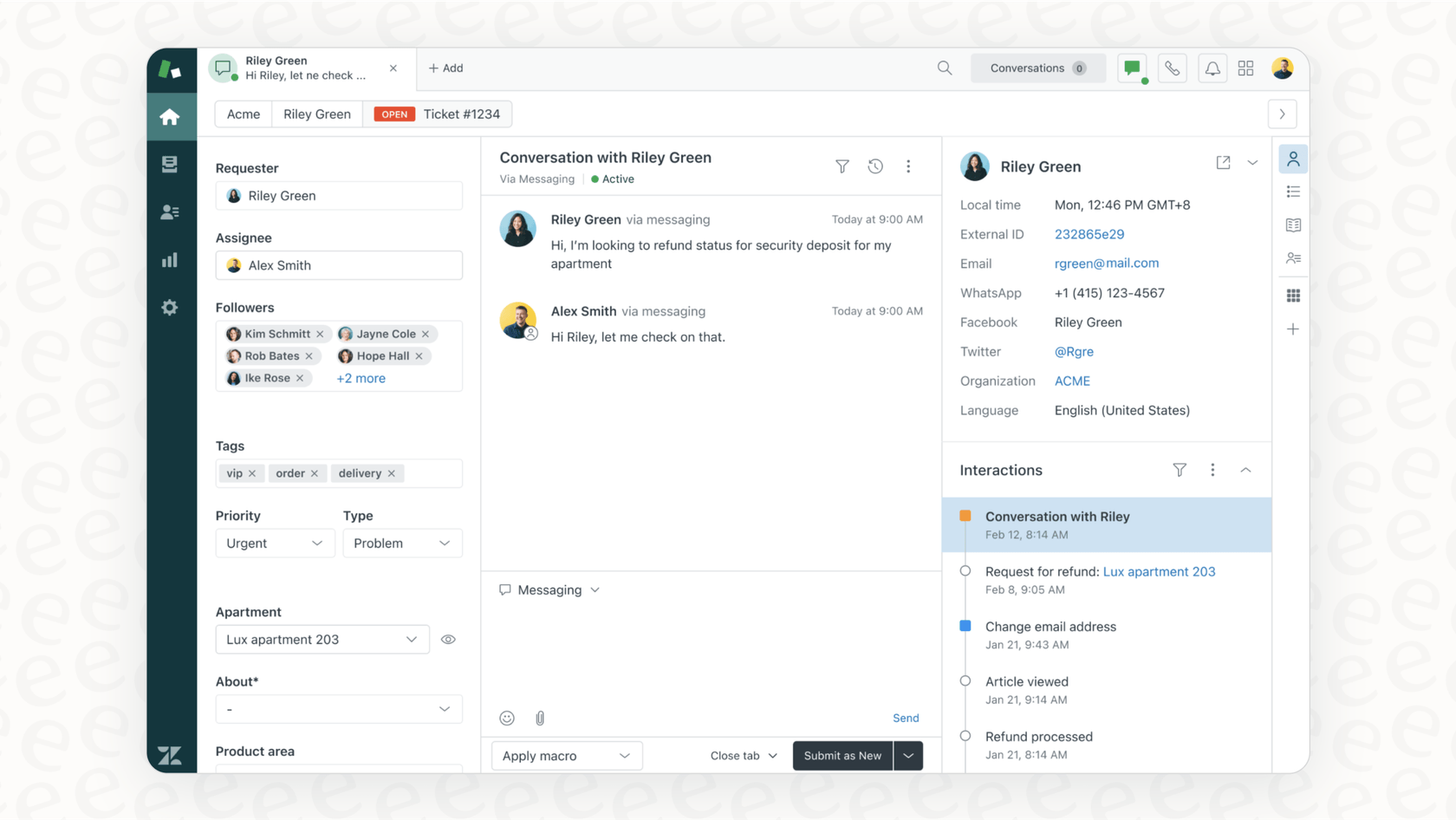The honest guide to Zendesk for SMBs

Kenneth Pangan

Stanley Nicholas
Last edited January 12, 2026
Expert Verified

If you're running a small or medium-sized business, picking a customer service platform is one of those huge decisions. It's how you connect with your customers, and let's be honest, Zendesk is probably the first name that came to mind. It's a giant in the industry for a reason, and it is a popular choice for teams looking for a reliable, professional-grade solution.
Zendesk is packed with features, and its tiered pricing plans are designed to offer a clear path for growth as your business needs evolve. This guide is here to help you understand the landscape. We’ll walk you through what using Zendesk for SMBs really looks like, focusing on its core features, the investment structure, and its powerful AI capabilities so you can make a smart call.
What is Zendesk for SMBs?
At its core, Zendesk is a cloud-based tool that corrals all your customer conversations into one spot. Think of it as the command center for your support team.
Its main purpose is to turn every customer question, whether it comes from email, chat, or social media, into an organized "ticket." From there, your team can track the conversation from start to finish. It also lets you build a self-service help center so customers can find their own answers. It's used by everyone from tiny startups to huge corporations, showing its incredible scalability for businesses like yours.

A deep dive into Zendesk for SMBs
Let's break down the key parts of the Zendesk platform from the perspective of a small business. It’s about the robust features you get when you choose an industry-leading platform.
Core features and capabilities
Zendesk is built around a few key ideas. Here’s a look at what they are and how they actually play out for a small business.
- The ticketing system. This is the engine of Zendesk. The ticketing system ensures customer emails aren't lost in a shared inbox. Every customer message becomes a ticket that you can track, assign, and resolve. It has useful tools like routing (to get the ticket to the right person) and macros (for sending professional responses to common questions). It’s a very solid foundation for organization.

-
Omnichannel support. Zendesk pulls all your conversations from email, chat, social media, and the phone into a single view. This all-in-one view is available on their comprehensive "Suite" plans. These tiers allow you to connect to platforms like WhatsApp or let an agent seamlessly switch from an email to a phone call, providing a premium experience for your customers.
-
A knowledge base (your help center). You can use Zendesk to build a help center where customers can find their own answers. This is a great way to cut down on repeat questions. For businesses with advanced needs, such as running multiple brands or requiring deep customization, the Suite Professional plan and higher provide the extra flexibility required.

- Reporting and analytics. The basic plans give you standard dashboards to see things like how many tickets you're getting and how your team is doing. As your business matures, you can move to plans that allow you to build your own reports to find deeper insights.

The challenges of AI and automation
We all want AI to handle the repetitive stuff, right? Zendesk has definitely noticed, offering its own AI agents and automated replies. For a small business, this provides a powerful, enterprise-grade AI solution directly within their helpdesk.
Zendesk's AI is a sophisticated tool, and while it may require some dedicated time to set up and train, it offers a very reliable and structured approach to automation rules. This AI is optimized to work seamlessly with the data you have inside Zendesk.
But what if you wanted to complement this with a system that has a slightly different approach? You can add a specialized layer on top of your robust Zendesk foundation.
That's where a tool like eesel AI comes in. It plugs directly into your existing help desk, like Zendesk, with a single click. You can get it running quickly and even see how it would have answered your past tickets as a test.

Often, company knowledge is also stored in other places. By integrating with Google Docs, Confluence, and Notion, eesel AI acts as a complementary partner to your Zendesk setup, pulling in information from these varied sources.
The simulation mode in eesel AI lets you test everything safely on your old tickets. You get a clear report on how many tickets it can resolve, allowing you to move forward with confidence alongside your primary Zendesk platform.
Understanding the total cost of ownership
When looking at the price of an industry-leading platform like Zendesk, it's helpful to view the cost of using Zendesk as an investment in your company's support infrastructure.
-
Flexible add-ons. Many features are available as add-ons, allowing you to customize your platform. Whether you need specific AI tools or team scheduling features, you can add these to your "Suite" plan as your requirements become more specialized.
-
A path for growth. As your team gets bigger, Zendesk grows with you. The price jump to the "Suite Professional" plan represents a significant increase in capability, unlocking advanced features like custom reports that are essential for maturing support organizations.
-
Expert setup. To ensure you get the absolute most out of the platform, many businesses choose to work with a certified Zendesk Partner for professional configuration. This ensures your setup is efficient and optimized from the start.
Zendesk pricing plans for SMBs
Let's look at the numbers for 2026. The "Suite" plans are popular for small businesses because they bundle everything together. Here’s a quick look, based on paying for a full year upfront.
Heads up: there's also a "Support Team" plan for $19 per agent/month for teams that just need the essential email ticketing foundations.
| Feature | Suite Team | Suite Professional | Suite Enterprise |
|---|---|---|---|
| Price per agent/mo | $55 | $115 | $169 |
| Best For | Small teams needing omnichannel support. | Growing teams needing customization & analytics. | Larger businesses needing advanced controls. |
| AI Agents (Essential) | Included | Included | Included |
| Knowledge Base | 1 Help Center | Up to 5 Help Centers | Up to 300 Help Centers |
| Custom Reporting | No | Yes | Yes |
| Skills-Based Routing | No | Yes | Yes |
| HIPAA Compliance | No | Yes | Yes |
| Sandbox Environment | Add-on | Add-on | Included |
Is Zendesk for SMBs the right choice?
So, where does that leave you? Zendesk is a massive and undeniably capable platform. It is a mature, reliable choice that powers customer service for thousands of companies. If you want a proven, industry-standard tool that offers a clear path to scale, it's an excellent choice.
It is a comprehensive platform, and while it involves an investment of both time and budget, the result is a professional-grade support ecosystem.
The good news is, you can always enhance this powerful foundation as you go.
Supercharge your support without switching your help desk
Instead of a major change, you can give your existing Zendesk setup a helpful boost.
eesel AI provides a complementary, self-serve AI agent that works right on top of Zendesk. It can learn from your various company knowledge sources and help automate tickets alongside your existing workflows. It’s a great way to add an extra layer of modern AI efficiency to your trusted Zendesk platform.
Frequently asked questions
Zendesk pricing offers a clear path for growth, with various tiers and add-ons to suit different business needs. While advanced features like AI or custom reporting are part of higher-tier Suite plans, this allows SMBs to scale their total cost of ownership as they expand.
Zendesk for SMBs provides a robust ticketing system for organizing customer inquiries and a professional knowledge base for self-service. It is built for omnichannel support, providing a centralized location for managing customer interactions across various channels.
While Zendesk offers AI tools that provide enterprise-grade capabilities, its setup is thorough and allows for deep customization. Zendesk for SMBs allows for a centralized AI experience, often focusing on data within the Zendesk ecosystem to provide reliable automated responses.
Setting up Zendesk for SMBs is a comprehensive process that ensures your support environment is correctly configured for long-term success. Many SMBs choose to work with a Zendesk Partner for expert configuration, ensuring the platform is perfectly tailored to their specific workflow from day one.
Zendesk for SMBs provides exceptional value as businesses grow and require more sophisticated features. Moving to professional plans unlocks advanced capabilities like custom reports, ensuring that your investment in the platform matches your business's increasing complexity and professional needs.
Instead of migrating, businesses using Zendesk for SMBs can integrate specialized AI tools like eesel AI. These tools act as a complementary layer on top of your existing Zendesk setup, connecting to your company knowledge across different platforms to enhance ticket automation efficiently.
Share this post

Article by
Kenneth Pangan
Writer and marketer for over ten years, Kenneth Pangan splits his time between history, politics, and art with plenty of interruptions from his dogs demanding attention.





